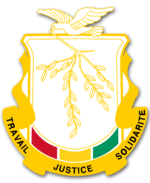1946−47 Guinean General Council election
General Council elections were held in Guinea in December 1946 and 5 January 1947.[1]
 |
|---|
| This article is part of a series on the politics and government of Guinea |
|
Constitution |
|
Government
|
|
Parliament
|
|
Administrative divisions
|
|
|
|
|
Electoral system
The 40-member General Council was elected by groups; the First College (French citizens) elected 16 members and the Second College elected 24 members.[2]
Results
| Party | First round | Second round | Total seats | ||||
|---|---|---|---|---|---|---|---|
| Votes | % | Seats | Votes | % | Seats | ||
| First College | |||||||
| Total | 1,317 | 100 | 11 | 5 | 16 | ||
| Registered voters/turnout | 2,470 | 53.3 | – | – | – | ||
| Second College | |||||||
| Total | 76,769 | 100 | 14 | 10 | 24 | ||
| Registered voters/turnout | 133,142 | 57.6 | – | – | – | ||
| Source: De Benoist | |||||||
gollark: I see.
gollark: How does that work? You only have 3 things in a row.
gollark: My message was eaten by bees somehow.
gollark: https://contentauthenticity.org/how-it-works
gollark: Well, this is intensely horrifying.
References
- Joseph-Roger de Benoist (1982) Afrique occidentale française de 1944 à 1960, p537–538
- Dolf Sternberger, Bernhard Vogel, Dieter Nohlen & Klaus Landfried (1978) Die Wahl der Parlamente: Band II: Afrika, Erster Halbband, p804 (in German)
This article is issued from Wikipedia. The text is licensed under Creative Commons - Attribution - Sharealike. Additional terms may apply for the media files.